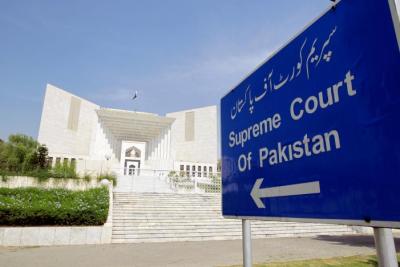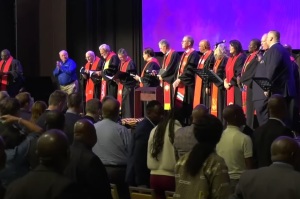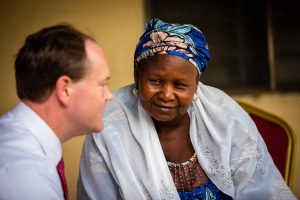Supreme Court of Pakistan bows to Islamist threats in religious freedom case

Islamist death threats compelled the Supreme Court of Pakistan on Thursday to remove part of a ruling recognizing an Ahmadi’s religious freedom, a move that will lead to more persecution of religious minorities, sources said.
The court’s surrender to Islamist demands came in an appeal by Mubarak Sani, a member of the Ahmadi Muslim group that Islamists consider heretical in the Muslim-majority country. Sani had been convicted under the Punjab Holy Quran (Printing and Recording) (Amendment) Act enforced in 2021, though he’d claimed the accusation related to an incident in 2019 before the law came into effect.
In its verdict, the court noted that Article 20 of Pakistan’s Constitution guaranteed citizens the right to profess, practice and propagate their religion, and that Sani had not committed a crime by publishing religious literature. The Supreme Court then ordered Sani’s release on bail.
The verdict led by Chief Justice Qazi Faez Isa infuriated Islamist groups, particularly the extremist Tehreek-e-Labbaik Pakistan (TLP), which started a campaign against Isa. Some TLP leaders announced bounties of up to 10 million rupees ($35,790 USD) for any Muslim who killed the chief justice.
Fearing unrest, the Punjab provincial government filed a review petition under Article 188 of the constitution, but on July 24 the Supreme Court declared it had not deviated in any way from the decisions of Federal Shariat Court and Supreme Court in approving the bail.
The verdict favoring Sani led to outrage in Islamist circles and a debate in the National Assembly’s Standing Committee on Law and Justice, where both the treasury and opposition benches agreed that the federal government should file a petition in the Supreme Court.
Besides the Punjab government’s plea seeking omissions of certain portions from the court’s July 24 revised verdict, the federal government also filed a miscellaneous plea on Aug. 17 under Prime Minister Shehbaz Sharif’s directives. In the Punjab government’s petition, it maintained that some leading Islamic clerics and members of parliament requested the federal government to approach the top court and highlight some portions of the verdict that they said merited correction. It further maintained that certain conclusions and observations made in other parts of the judgment seemed to be a mistake and were inconsistent with previous rulings of the highest court.
Under immense pressure and threats, the Supreme Court announced that it was ready to review its verdict for a second time, a first in the country’s judicial history.
On Tuesday, hundreds of activists belonging to Islamic extremist parties, including the TLP and the Jamiat Ulema-e-Islam-Fazl (JUI-F), breached security and reached the Supreme Court building, where speakers openly threatened judges to withdraw the verdict. They said the judgment had “hurt the sentiments of the entire nation” and pledged that they were ready to render any sacrifice for the protection and sanctity of Islam and the finality of the prophethood of Muhammad.
Surrendering to the Islamists’ demand, the three-member bench headed by Isa and including Justice Irfan Saadat Khan and Justice Naeem Akhtar Afghan on Wednesday ordered the exclusion of the paragraphs from the verdict, including the one related to freedom of religion, asserting that the deleted portions cannot be cited as precedent in any judgment.
“I don’t want to say [it] but am helpless; I pray in every prayer that may God prevent me from making any wrong decisions,” Isa said during the hearing in Islamabad, according to media reports.
Some veteran reporters who attended the hearing said that all three judges were visibly fearful and under immense pressure. Many people in Pakistan, including a former governor and a high court judge, have been murdered for speaking in favor of those falsely charged with blasphemy, they said.
‘No hope left’
The Supreme Court’s “second review” of its verdict shocked rights activists and church leaders, who said the surrender to Islamist pressure does not bode well for Christians and other minorities.
“We were not expecting the Supreme Court to capitulate to extremist forces in this manner,” said Church of Pakistan President Bishop Azad Marshall. “When the highest court of the country fails to protect the guarantees given by the constitution regarding religious freedom for all citizens irrespective of their faith affiliations, there is no hope left for any improvement in our situation.”
The church leader expressed fears of an increase in blasphemy cases and violence against Christians.
“Religious forces have instilled more fear in the judiciary,” he said. “In such circumstances, I doubt we can expect any justice for those falsely accused of blasphemy.”
Marshall said that by deleting its observations regarding the freedom to profess any religion, the Supreme Court has shown its helplessness in safeguarding the constitution.
Minorities Alliance Pakistan Chairman Akmal Bhatti termed the court’s decision “a big blow to freedom of religion in Pakistan.”
“It's very sad,” he said. “The extremist forces first successfully harassed trial courts, then high courts, and now the Supreme Court. Who would take the bails of Christians and others charged with blasphemy now?”
Attorney Yasser Latif Hamdani, a progressive Muslim rights activist and author, said he had lost faith in Pakistan.
“Jinnah [the country’s founder] certainly didn’t imagine that one day the same people who called him Kafir-e-Azam [infidel] would be forcing the Supreme Court to change its decision — a simple decision that says that a citizen of Pakistan can pray how he or she likes within the confines of his/her home or place of worship,” Hamdani wrote on his Facebook page. “If Qazi Faez Isa can be forced to change his decision, this country will never go forward. It seems that Jinnah made a terrible mistake giving these idiots a country.”
Pakistan ranked seventh on Open Doors’ 2024 World Watch List of the most difficult places to be a Christian, as it was the previous year.
This article was originally published by Christian Daily International–Morning Star News.
Christian Daily International provides biblical, factual and personal news, stories and perspectives from every region, focusing on religious freedom, holistic mission and other issues relevant for the global Church today.





























